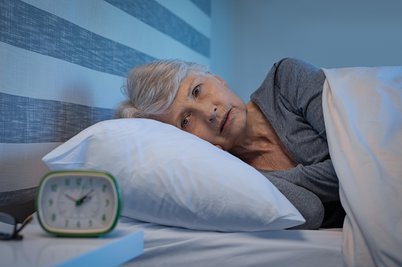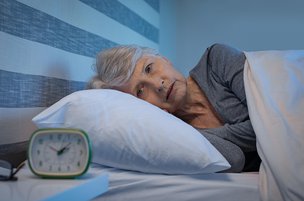
If you're aged over 65 and struggle to get a good nights sleep, you're not alone! Changes to our sleep pattern are perfectly normal as we get older.
The recommended sleep duration for older adults is 7-8 hours per night, yet many, much to their dismay, struggle to drift off or sleep through the night. Getting the recommended hours of sleep is related to better brain health and physical health.
Read on to learn more about sleep, and find out what our top 5 tips for a better slumber are!
The 5 Stages of Sleep
Around every 90 minutes during the night, a person will cycle through 5 different stages of sleep. There are 2 types of sleep:
1. REM - rapid eye movement consisting of a single stage
2. Non-REM - sleep without rapid eye movement consisting of multiple stages
Stage 1
During this stage of non-REM sleep, a person is just beginning to drift off:
- Lasts approximately 3 minutes
- Muscles begin to relax
- Heartbeat and breathing slow down
- Alpha and theta brain waves are produced
Stage 2
During stage 2 of non-REM sleep, a person will be in a light sleep before entering deep sleep:
- Lasts approximately 25 minutes
- No eye movements
- Brainwaves spike up and down, known as 'sleep spindles'
- Heartbeat and breathing continue to slow
- Body temperature drops
Stages 3 & 4
Stages 3 & 4 are the last stages of non-REM sleep where a person is in their deepest sleep. These stages are otherwise known as delta or slow wave sleep:
- Arousal from sleep is difficult
- Immune system strengthens
- Tissue repair and growth & cell regeneration occur
- Delta brain waves are present
- No eye movements
- Body is fully relaxed
- Heartbeat and breathing are at their slowest rate
Stage 5
REM sleep begins during stage 5 of sleep and happens around 90 minutes after a person falls asleep. This is often the stage where a person will dream. Initially, REM sleep lasts for around 10 minutes but it increases with each cycle with the final usually lasting around 60 minutes:
- Lasts between 10-60 minutes each time
- Rapid eye movements
- Limb muscles become temporarily paralysed
- Breathing and heartbeat increase
- Brain activity increases
Key Side Effects of Poor Sleep
- Stress
- Low mood
- Forgetfulness
- Lack of focus & motivation
- Tiredness
- Irritability
Common Sleep Disorders
Insomnia
Insomnia is a chronic sleep condition, the key symptoms being: persistent difficulty with falling asleep, waking up during the night, waking early in the morning and feeling tired and irritable the following day. It is often caused by health problems, particular medications, a stressful event or anxiety.
Regularly disrupted sleep can result in an increased risk of health conditions such as heart disease, diabetes and mental health issues so it is wise to address insomnia as soon as it is suspected. Not only this, but poor sleep is also linked to accidents and injuries due to decreased concentration and attention span.
The most recommended treatment for insomnia is Cognitive Behavioural Therapy (CBT) but sometimes medications may be prescribed to aid sleep.
Sleep Apnea
Sleep Apnea is a condition where a person stops breathing whilst they sleep. This happens due to the airways in the throat becoming too narrow to allow air to pass through.
One way to treat sleep apnea is to connect a person to a continuous positive airway pressure (CPAP) machine which creates enough airflow to allow a person to breathe whilst they sleep. If this is not effective, bilevel positive airway pressure (BPAP) will be tried. If this still doesn't help, surgery may be necessary.
Restless leg syndrome
Restless leg syndrome is a neurological disorder causing an uncomfortable feeling in the legs whilst a person tries to sleep, making it difficult for them to fall asleep.
The treatment for restless leg syndrome is often oral medication which can be prescribed by a persons' GP. Another way sufferers of the syndrome can aid their ability to sleep is by practising good sleep hygeine.
Narcolepsy
Narcolepsy is a nervous system disorder, causing serious daytime drowsiness and sudden bouts of sleep. It causes cataplexy where someone suddenly collapses due to a loss of muscle control. Understandably, this causes huge disruption to the lives of those who have the disorder.
Doctors often prescribe medications including stimulants or SSRI's to treat the symptoms of narcolepsy. Exercising regularly and lifestyle adjustments can also help people who have the disorder.
Top 5 Sleeping Tips
1. Decide upon a routine and try to stick to it
Having a regular routine including waking up and going to bed at the same time each day is great for your internal body clock. Here are some routine tips:
- Try to avoid napping during the day if you can as you may not be tired enough to fall asleep when bed time arrives! If you do try to limit yourself to 15-20 minutes early in the day by setting yourself an alarm.
- Only use your bedroom for sleeping so that your mind associates it only with sleep
- Avoid having lie-ins as these could disrupt your natural sleep-wake system
- If you get sleepy after eating, get up and do something to avoid falling asleep on the sofa before bedtime!
2. Allow your body & mind to relax before bed
Relaxing yourself before bed can greatly assist in helping you drift off to sleep. Here are some relaxation suggestions:
- Have a nice warm bath just before bed to relax your muscles
- Listen to some soothing music
- Practise meditation
- Have a hot mug of milk or horlix
3. Adjust your diet & exercise
It is known that people who exercise regularly experience a better quality of sleep. When you exercise, your body temperature rises, your metabolism increases and hormones are stimulated meaning that it is best to exercise in the mornings or afternoon as opposed to evenings. Here are some exercise ideas for older people:
- Online exercise videos (view our article to find out our 6 favourite online exercise videos for over 60's!)
- Swimming / aqua aerobics
- Gym & exercise classes
Diet can also have a significant impact on your ability to sleep, particularly close to your bedtime. Here are some things for consideration:
- Caffeine and nicotine should be limited - you could always try de-caff coffee instead!
- Many believe that alcohol helps them to sleep, yet whilst it can certainly relax you, it effects your sleep cycle
- Don't drink too much before bed to avoid waking up to use the loo in the night
- Restrict sugary foods as these are linked to interrupted sleep
4. Make changes to your sleeping environment
A comfortable sleeping environment is key to being able to fall asleep easily at bedtime. Here are a few things to ensure that the environment is best for sleeping:
- Ensure that your bedroom is the right temperature - a cool room is best for sleeping so ensure you have the window open or have a fan on if you feel too warm.
- Make sure that the room is as quiet as possible - if there's noise that you cannot control try blocking it out with ear plugs or a white noise machine.
- If your bed in uncomfortable, solve the issue by replacing your mattress or pillows for ones that offer more comfort.
5. Identify & address underlying problems
Sometimes, treating an underlying problem which is leading to your disrupted sleep can be the resolution to improving your ability to fall & stay asleep. Consider asking yourself the following questions:
- Have you started taking any new medications? It could be worth checking with your GP whether they have side-effects related to sleep.
- Are you going through a stressful time in your life? If you have got a lot on your mind, this can lead to overthinking before bed which leads to a poor nights sleep. Think about ways that you can reduce and help you cope with the stress.
- Do you have any mental health conditions such as depression or anxiety? Poor mental health can lead to feelings of hopeless or you may even feel emotionless. Speak to a Dr who will be able to recommend suitable treatment which may be medication or cognitive behavioural therapy (CBT).
- Do you have any health problems which are hindering your sleep? For instance, do you suffer from heartburn, breathing problems or heart problems? If so, we recommend advising your GP that your sleep is being affected as they may have recommendations/be able to find a solution.
Are you looking for care for someone? Contact our friendly team of Care Advisers for complimentary help & support!
Call us on 01865 680331
Send message

